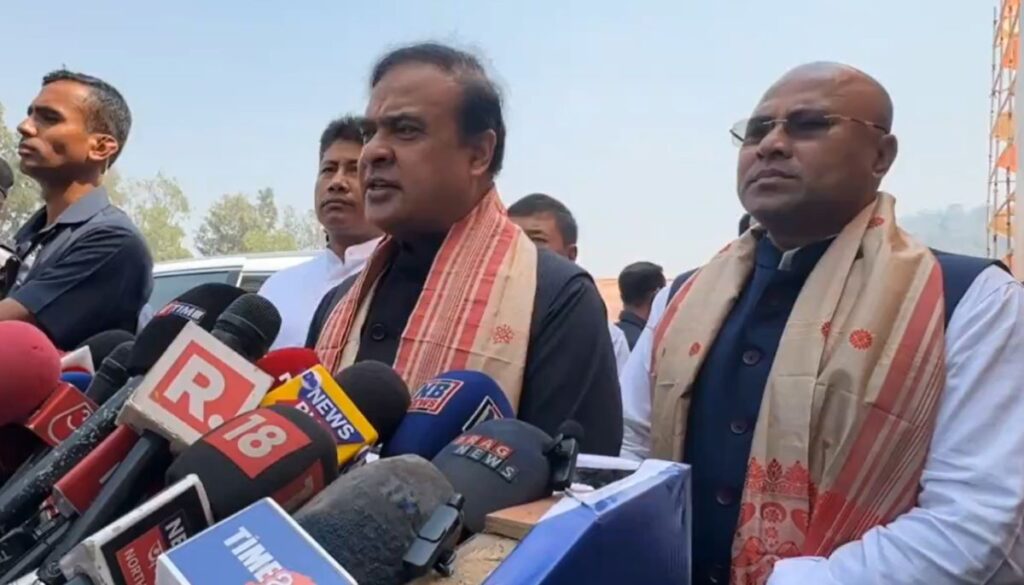Assam is simmering again. Protests against the Citizenship Amendment Act (CAA) have flared up after the central government announced its implementation.

After the CAA is implemented, protesters said, lakhs will enter Assam. Himanta Biswa Sarma declared, “I will be the first to protest if this happens.”
Assam Rekindles CAA Protest Fires
Assam chief minister Himanta Biswa Sarma said on Tuesday that he will step down first, even if one person who hasn’t applied for the state’s National Register of Citizens (NRC) is granted citizenship. This comes a day after protests broke out throughout the state in response to the Center’s notification of the controversial Citizenship (Amendment) Act, 2019 (CAA), according to news agency PTI.
Citizenship for undocumented non-Muslim migrants from Afghanistan, Bangladesh, and Pakistan is made possible by the CAA, 2019.
“I am a son of Assam and if a single person who has not applied for the NRC in the state gets citizenship, I will be the first to resign,” PTI quoted Himanta Sarma as saying on the sidelines of a programme at Sivasagar.
The demonstrators assert that after the Citizenship Amendment Act is put into effect, lakhs of individuals would be able to enter the state. “I’ll be the first to protest if this happens,” the chief minister of Assam declared.
Assamese protests against the Citizenship Amendment Act implementation broke out, burning copies of the law along with effigies of Prime Minister Narendra Modi and Home Minister Amit Shah, according to news agency PTI.
To express their opposition to the CAA’s implementation, the Congress set copies of the law on fire in several locations throughout the district, and the Asom Jatiyatabadi Yuba Chatra Parishad (AJYCP) set fire to the prime minister’s and the home minister’s effigies in Lakhimpur.
Sarma said those who have come to India after 2014 will not get citizenship, and the number of such applicants will be “negligible”.
“People do not want to identify themselves as foreigners. There may be 50,000-60,000 applications from three districts of Barak Valley while it will be negligible in districts of Brahmaputra Valley,” the chief minister said.
There is nothing new about the CAA as it was enacted earlier, Sarma said, adding that “now the time has come for application on the portal”.
The chief minister of Assam said, “The data on the portal will speak now, and it will become clear whether the claims of those opposing the Act stand factually correct or not.”
According to him, Assamese folks would find out within a month whether thousands or lakhs of individuals are requesting to become citizens of the state.
“Enough has been said on CAA and now it is time to prove the claims,” the chief minister stated, adding that he respects both the demonstrators and the CAA’s supporters.
According to Sarma, “it will also be evident who was accountable for the five fatalities that occurred during the violent protests in 2019.”
Also Read: TOP 5 HAVELLS CEILING FAN FOR 2024
The federal government will now begin awarding Indian nationality to persecuted non-Muslim migrants from Bangladesh, Pakistan, and Afghanistan who arrived in India up until December 31, 2014, in accordance with the CAA regulations.
These consist of Christians, Parsis, Buddhists, Jains, Sikhs, and Hindus. Since regulations had not been announced until now, the law could not go into effect.
FAQs:
- What is the CAA?
The Citizenship Amendment Act (CAA), passed in 2019, expedites citizenship for persecuted minorities (Hindu, Sikh, Jain, Buddhist, Parsi, and Christian) from Pakistan, Afghanistan, and Bangladesh who entered India before December 31, 2014.
- Why are there protests in Assam?
Assamese people fear the CAA will grant citizenship to a large number of Bengali Hindus, potentially altering the state’s demographics and cultural identity. This contradicts the Assam Accord of 1985, which aimed to control illegal immigration.
- What is the Assam government’s stance?
The BJP-led Assam government maintains that only those who have applied under the National Register of Citizens (NRC) will be considered for CAA benefits. However, the opposition argues this isn’t a safeguard.
- What are the possible future implications?
The protests could intensify, straining relations between the center and the state. It might also reignite anxieties about illegal immigration across India.
- What are the solutions?
Open communication between the government and the Assamese people is crucial. Addressing their concerns and finding a way to implement the CAA that protects both national security and Assamese identity is essential.










